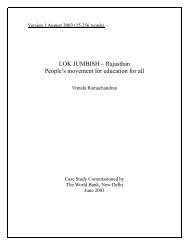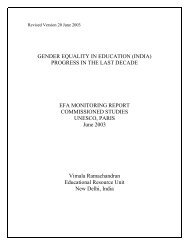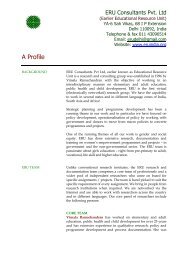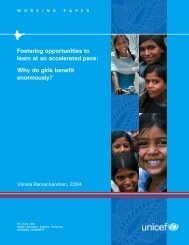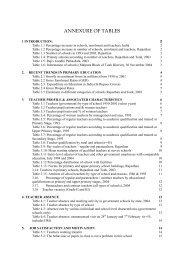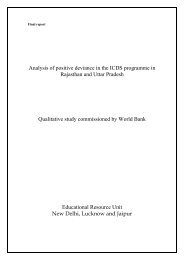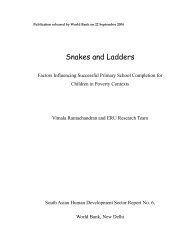primary school teachers the twists and turns of everyday practice
primary school teachers the twists and turns of everyday practice
primary school teachers the twists and turns of everyday practice
Create successful ePaper yourself
Turn your PDF publications into a flip-book with our unique Google optimized e-Paper software.
Version 20 Oct 08, edited final<br />
prohibiting <strong>school</strong>s from conducting examinations <strong>and</strong> inspectors from asking for<br />
examination results (M P Vijay Kumar, interviewed on 26 May 2008).<br />
As soon as I joined as a teacher in 1994, I underwent 20 days <strong>of</strong> training in joyful learning. It was<br />
exciting but did not relate to our classroom. There was a lot <strong>of</strong> singing, dancing <strong>and</strong> storytelling,<br />
but <strong>the</strong>re was no learning. I found it difficult to use <strong>the</strong>se approaches all <strong>the</strong> time. I felt that this<br />
approach did not help me reach all <strong>the</strong> children. Also, I found it difficult to tell stories to children in<br />
Class 1…<br />
Later I was asked to teach Grade 3 in <strong>the</strong> Corporation Primary School in North Chennai. In <strong>the</strong><br />
first few days it became clear to me that children in my class had difficulties in writing <strong>and</strong><br />
reading. I did a quick test <strong>and</strong> found that over 70 per cent <strong>of</strong> my students did not even know <strong>the</strong><br />
alphabets <strong>and</strong> <strong>the</strong>y were already in Class 3!<br />
Training is so distant from our actual classroom needs (…) that is why <strong>the</strong> foundation is not <strong>the</strong>re.<br />
I used to submit lesson plans every week (because I was required to do so) but it was not related to<br />
<strong>the</strong> actual classroom situation or what I actually did in class.<br />
Things changed in 2004 after <strong>the</strong> ABL programme was introduced. For me training now means<br />
doing things on my own <strong>and</strong> with o<strong>the</strong>r <strong>teachers</strong> <strong>and</strong> learning from those experiences.<br />
(Source: Interview with a teacher in Chennai, December 2007).<br />
As this booklet was being drafted, newspapers reported that <strong>teachers</strong> in Tamil Nadu<br />
were protesting <strong>and</strong> had even called for a strike. Teachers who were involved in <strong>the</strong><br />
Chennai city programme point out that <strong>the</strong> scaling up was done a bit too quickly.<br />
Apparently, one <strong>of</strong> <strong>the</strong> reasons for <strong>the</strong> protest was that <strong>the</strong> TL materials prepared for<br />
Classes 3 <strong>and</strong> 4 were not adequately tested. A teacher leader who is unhappy with<br />
<strong>the</strong> ABL programme asked: ‘How can <strong>the</strong>y expect <strong>teachers</strong> to be seated on <strong>the</strong> floor<br />
all <strong>the</strong> time? Older <strong>teachers</strong> <strong>and</strong> those who have health problems cannot do<br />
this…what is wrong in having a table <strong>and</strong> chair where <strong>the</strong> teacher can sit?’ This may<br />
sound trivial, but has become a common refrain in <strong>the</strong> state. Many <strong>teachers</strong> <strong>and</strong><br />
administrators, who for years have been used to a teacher-centred approach, find it<br />
difficult to change <strong>the</strong>ir ways <strong>and</strong> work <strong>the</strong>ir world around children.<br />
Many commentators argue that <strong>the</strong>re is nothing fundamentally different about ABL.<br />
The changes are cosmetic. All that has been done is that <strong>the</strong> textual content has now<br />
been transferred onto cards, which are prepared centrally by <strong>the</strong> education<br />
department. This by itself cannot make <strong>the</strong> difference. The real difference will take<br />
place when <strong>teachers</strong> engage in an approach that is flexible <strong>and</strong> suits <strong>the</strong> pace <strong>and</strong><br />
ability <strong>of</strong> <strong>the</strong> learner. Merely dividing <strong>the</strong> children into groups <strong>and</strong> giving <strong>the</strong>m<br />
cards does not result in peer learning. We heard that, barring a few <strong>school</strong>s, <strong>the</strong> old<br />
mindset <strong>of</strong> <strong>the</strong> <strong>teachers</strong> has not changed. We came away convinced that this issue<br />
needs to be addressed seriously <strong>and</strong> this is essential to ensure that ABL takes root<br />
<strong>and</strong> is not discontinued due to change in leadership, just as <strong>the</strong> Nali Kali programme<br />
was discontinued in Karnataka. 10<br />
Whereas <strong>the</strong> state government in Tamil Nadu has clearly engaged with <strong>the</strong> issue <strong>of</strong><br />
teacher-training <strong>and</strong> experimented with different models <strong>and</strong> strategies for<br />
10 The ‘Nali Kali’ programme in Karnataka was ano<strong>the</strong>r attempt during <strong>the</strong> mid- to late- 1990s at<br />
adapting <strong>the</strong> Rishi Valley approach in government <strong>school</strong>s in Mysore district. The programme started<br />
as a pilot in one entire block (HD Kote) <strong>of</strong> <strong>the</strong> district but was discontinued when <strong>the</strong>re was change in<br />
leadership <strong>of</strong> <strong>the</strong> programme.<br />
56




